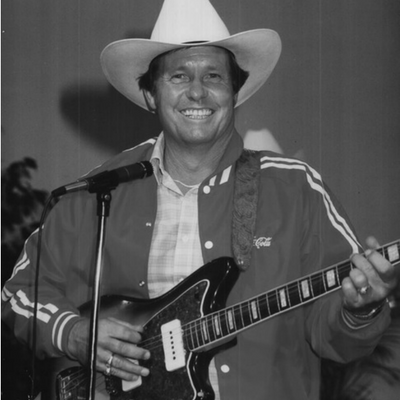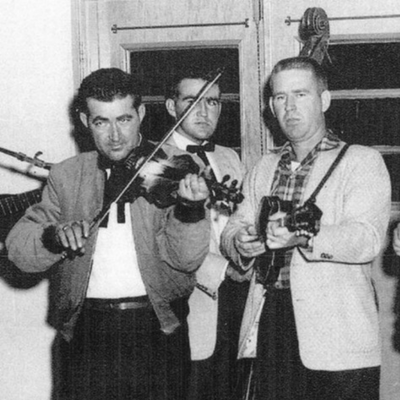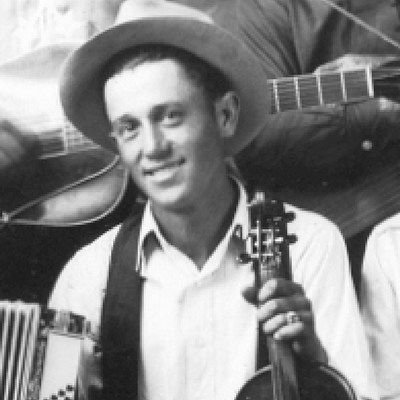Bobby Joe "Bo Jack" Killingsworth
Country & Rockabilly Entertainer

As read by Ronnie Brooks, McNairy County Mayor
June 10, 2016
It is perhaps most fitting on the eve of our annual celebration of local music heritage, that we honor our very own McNairy County rockabilly legend. And it’s not stretching the point, even a little bit, to call Bobby Joe Killingsworth a rockabilly music legend. He has all the credentials to back it up.
Bobby, or as most people know him, Bo Jack, is a true McNairy County original. The first time Bo Jack remembers performing on stage was a 1948 talent competition at Gilchrist, Tennessee, but his music education began long before that. He grew up listening to, and learning from, the old-time pickers in the area, as well as the new sounds emerging during the heyday of postwar mid-south radio. From those foundations, Bo Jack’s music would evolve in new and interesting directions that reflected changing tastes in American popular music. He would embark on a music career that took him from coast to coast, and all points in between, playing with, and earning the respect of some of the most iconic figures in American music history. Perhaps more importantly, Bo Jack has no regrets. In a recent interview, he said “I never wanted music to be like a job, so I just did it like I wanted to…Some people dream of that, but I got to live it.” Not many people in the music industry can say they’ve set their own uncompromising course and kept to it for more than sixty years, but Bo Jack Killingsworth can. We’d say that worked out pretty well for him.
But before the accolades and rubbing elbows with celebrities, there were dues to be paid. As a young teenager Bo Jack assembled his first band, The Monclairs, in the early 1950s and started playing anywhere they could find a job. The group found work in area clubs including Fred’s Place Tavern near Adamsville and the more infamous joints like the Shamrock and Plantation Club along the state line. If it was a little dangerous, it was still a good training ground for a young musicians just cutting their performing teeth. Even then, people knew there was something different about Bo Jack’s music. It wasn’t old-time, it wasn’t the smooth Nashville sound, and it wasn’t altogether pop music either. Like many of his contemporaries, Bo Jack’s music had picked up influence from a variety of sources including local bluegrass and hillbilly pickers, and the new sounds emanating from Memphis radio and the Grand Old Opry—especially the swagger, and raw attitude of country music’s original bad boy, Hank Williams (Sr.). Keep in mind that Hank was still considered a outsider to the country music establishment, and no one had yet heard of rockabilly or rock ’n’ roll music. Little wonder that people had a hard time putting a finger on Bo Jack’s distinctive sound.
By the late 50s an early 60s Bo Jack was getting better paying gigs and more recognition on the regional music circuit. He was still living in Gilchrist but playing more and more dates in popular regional venues. In 1962, he moved to Memphis to be a little closer to the action. It was around that time that the legendary nightclub owner, promoter, rockabilly musician and recording artist, Eddie Bond, heard about Bo Jack. The McNairy County boy was making quite a name for himself as an entertainer, and reliable sideman, on the Memphis music scene. Eddie asked Bo Jack to join his band in 1966 and the two formed a collaborative musical partnership that would last forty years.
Bond saw in Bo Jack, a showman with a rare gift for comedy as well as music. Bo Jack was capable of establishing a hilarious comedic persona, and in the next moment provide high quality vocal and musical accompaniment for any style of music Bond might require. He was the whole package. When Bond started fishing around for a character name for his new side kick, Killingsworth recalled that a high school teacher back at Stantonville had given him the nickname Bo Jack, and thus was Cousin Bo Jack born.
In 1966 Eddie Bond and the Stompers took to the airwaves on WHBQ Memphis, Channel 13, with Cousin Bo Jack in a floppy hat and a patched pair of overalls. He would become a comedic and musical mainstay of Bond’s first weekend TV program. In 1968 the highly rated variety show would move to a coveted weekday morning time slot, five days a week, where it enjoyed widespread popularity, remaining on the air for ten years. The show proved to be a great vehicle for reviving Bond’s waning music career thanks, in no small part, to Bo Jack’s considerable talents. At the height of the show’s popularity Bo Jack found it difficult to move around the streets of Memphis without being recognized, especially if he had on a pair of those trademark overalls. One of the show’s biggest fans was none other than Elvis Presley, who reportedly tuned in every morning, when he was in town, for a daily dose of music and comedy. The lasting popularity of the show is further evidenced by the fact that it was revived for an encore run of more that five years in the 1990s.
TV kept Bo Jack in the spotlight while providing opportunities to increase his growing popularity by teaming up with entertainment industry elites, who often appeared on the morning show to promote their latest project. Bo Jack toured widely with Bond and the Stompers, or as he likes to say, he went “from the Los Vegas Strip to the Louisiana Hayride,” sharing the stage with some of rockabilly and country music’s biggest stars. During the same period, Bo Jack was in demand as a musician and performed in a number of Memphis and Nashville’s most storied recording studios, backing Bond and others. Some might be surprised to learn that Bo Jack can even be heard on a movie sound track that helped make another McNairy County boy famous. Eddie Bond is widely credited with calling national attention to Buford Pusser with his country hit the Legend of Buford Pusser. When it came time to make the soundtrack for the Walking Tall movies, Bo Jack was invited to work on the project with Bond. He can be heard on that soundtrack along with dozens of other recordings from the era.
We don’t often name drop at the Hall of Fame inductions, but the list of famed entertainers Bo Jack Killingsworth has shared stage and studio with, is singularly impressive. For those who might not be familiar with his achievements, this will give an immediate sense of just how significant and far reaching his musical career has really been. Bo Jack, himself, would never tell you all of this, but we are not so shy about sharing his accomplishments. This is a partial, I repeat partial, list of those Bo Jack has had the pleasure of working with at one time or another over a incredible sixty years in music: Roy Acuff, Ernest Tubb, Charlie Louvin, Faren Young, Jimmy Dickenson, Charlie Feathers, Bud Deckleman, Mel Tillis, Webb Pierce, Ace Cannon, Loretta Lynn, Bill Anderson, Narvel Felts, Hank Thompson, Sunny Burgess and the Pacers, Carl Perkins, Carl Mann, Charlie Rich, Johnny Cash, Gene Simmons, Jerry Lee Lewis, Billy Lee Riley, Bobby Lord, Dale Reeves, Johnny Paycheck, Billy Walker, Jeannie Seely, Jimmy C. Newman, John Anderson, Steve Wariner, Hank Williams Jr., Tim McGraw, Tracy Lawrence, and Kenny Chesney. Maybe you recognized a name or two?
That list goes on and on, but you get the point. Bo Jack has been honored with awards too numerous to mention, over the years, but it is perhaps most significant that he has been recognized as a pioneer in the music genre we like to lay claim to as our very own here in Southwest Tennessee. In 1999 Bo Jack was inducted into the Rockabilly Hall of Fame as that organization’s 111 member. More recently in 2014 he was inducted into the International Rockabilly Hall of Fame in Jackson, Tennessee where he continues to play, on occasion, helping to preserve and promote an art form he was influenced by, and helped shape.
Maybe the name of Bo Jack’s latest band, Rockin’ Country, says it all. The name bears witness to one man’s pride in our region’s distinctive musical sound and the depths of our music heritage. He is justifiably proud of his music, and his honored place in that heritage has been rightfully secured.
Bo Jack will tell you he has retired from music, but don’t believe it. You are just as likely as not, on any given weekend, to find Bo Jack playing his unique brand of rockin’ country somewhere in the region. He still plays benefits, community functions, and other shows on occasion. Perhaps most appropriately, you can sometimes see him at the Rockabilly Hall of Fame and Museum, or at the Rockabilly Highway Revival here in Selmer, if his “leisurely retirement schedule" permits him to attend. Ask anybody and they will tell you that, Bo Jack’s version of retirement is more rockin’ than rocking chair. You’ll see in just a few minutes. Bo Jack Killingsworth can still get it done.
He is our very own rockin’ country legend, and it is my distinct honor to induct Bobby Joe “Bo Jack” Killingsworth into the McNairy County Music Hall of Fame in the class of 2016.
June 10, 2016
It is perhaps most fitting on the eve of our annual celebration of local music heritage, that we honor our very own McNairy County rockabilly legend. And it’s not stretching the point, even a little bit, to call Bobby Joe Killingsworth a rockabilly music legend. He has all the credentials to back it up.
Bobby, or as most people know him, Bo Jack, is a true McNairy County original. The first time Bo Jack remembers performing on stage was a 1948 talent competition at Gilchrist, Tennessee, but his music education began long before that. He grew up listening to, and learning from, the old-time pickers in the area, as well as the new sounds emerging during the heyday of postwar mid-south radio. From those foundations, Bo Jack’s music would evolve in new and interesting directions that reflected changing tastes in American popular music. He would embark on a music career that took him from coast to coast, and all points in between, playing with, and earning the respect of some of the most iconic figures in American music history. Perhaps more importantly, Bo Jack has no regrets. In a recent interview, he said “I never wanted music to be like a job, so I just did it like I wanted to…Some people dream of that, but I got to live it.” Not many people in the music industry can say they’ve set their own uncompromising course and kept to it for more than sixty years, but Bo Jack Killingsworth can. We’d say that worked out pretty well for him.
But before the accolades and rubbing elbows with celebrities, there were dues to be paid. As a young teenager Bo Jack assembled his first band, The Monclairs, in the early 1950s and started playing anywhere they could find a job. The group found work in area clubs including Fred’s Place Tavern near Adamsville and the more infamous joints like the Shamrock and Plantation Club along the state line. If it was a little dangerous, it was still a good training ground for a young musicians just cutting their performing teeth. Even then, people knew there was something different about Bo Jack’s music. It wasn’t old-time, it wasn’t the smooth Nashville sound, and it wasn’t altogether pop music either. Like many of his contemporaries, Bo Jack’s music had picked up influence from a variety of sources including local bluegrass and hillbilly pickers, and the new sounds emanating from Memphis radio and the Grand Old Opry—especially the swagger, and raw attitude of country music’s original bad boy, Hank Williams (Sr.). Keep in mind that Hank was still considered a outsider to the country music establishment, and no one had yet heard of rockabilly or rock ’n’ roll music. Little wonder that people had a hard time putting a finger on Bo Jack’s distinctive sound.
By the late 50s an early 60s Bo Jack was getting better paying gigs and more recognition on the regional music circuit. He was still living in Gilchrist but playing more and more dates in popular regional venues. In 1962, he moved to Memphis to be a little closer to the action. It was around that time that the legendary nightclub owner, promoter, rockabilly musician and recording artist, Eddie Bond, heard about Bo Jack. The McNairy County boy was making quite a name for himself as an entertainer, and reliable sideman, on the Memphis music scene. Eddie asked Bo Jack to join his band in 1966 and the two formed a collaborative musical partnership that would last forty years.
Bond saw in Bo Jack, a showman with a rare gift for comedy as well as music. Bo Jack was capable of establishing a hilarious comedic persona, and in the next moment provide high quality vocal and musical accompaniment for any style of music Bond might require. He was the whole package. When Bond started fishing around for a character name for his new side kick, Killingsworth recalled that a high school teacher back at Stantonville had given him the nickname Bo Jack, and thus was Cousin Bo Jack born.
In 1966 Eddie Bond and the Stompers took to the airwaves on WHBQ Memphis, Channel 13, with Cousin Bo Jack in a floppy hat and a patched pair of overalls. He would become a comedic and musical mainstay of Bond’s first weekend TV program. In 1968 the highly rated variety show would move to a coveted weekday morning time slot, five days a week, where it enjoyed widespread popularity, remaining on the air for ten years. The show proved to be a great vehicle for reviving Bond’s waning music career thanks, in no small part, to Bo Jack’s considerable talents. At the height of the show’s popularity Bo Jack found it difficult to move around the streets of Memphis without being recognized, especially if he had on a pair of those trademark overalls. One of the show’s biggest fans was none other than Elvis Presley, who reportedly tuned in every morning, when he was in town, for a daily dose of music and comedy. The lasting popularity of the show is further evidenced by the fact that it was revived for an encore run of more that five years in the 1990s.
TV kept Bo Jack in the spotlight while providing opportunities to increase his growing popularity by teaming up with entertainment industry elites, who often appeared on the morning show to promote their latest project. Bo Jack toured widely with Bond and the Stompers, or as he likes to say, he went “from the Los Vegas Strip to the Louisiana Hayride,” sharing the stage with some of rockabilly and country music’s biggest stars. During the same period, Bo Jack was in demand as a musician and performed in a number of Memphis and Nashville’s most storied recording studios, backing Bond and others. Some might be surprised to learn that Bo Jack can even be heard on a movie sound track that helped make another McNairy County boy famous. Eddie Bond is widely credited with calling national attention to Buford Pusser with his country hit the Legend of Buford Pusser. When it came time to make the soundtrack for the Walking Tall movies, Bo Jack was invited to work on the project with Bond. He can be heard on that soundtrack along with dozens of other recordings from the era.
We don’t often name drop at the Hall of Fame inductions, but the list of famed entertainers Bo Jack Killingsworth has shared stage and studio with, is singularly impressive. For those who might not be familiar with his achievements, this will give an immediate sense of just how significant and far reaching his musical career has really been. Bo Jack, himself, would never tell you all of this, but we are not so shy about sharing his accomplishments. This is a partial, I repeat partial, list of those Bo Jack has had the pleasure of working with at one time or another over a incredible sixty years in music: Roy Acuff, Ernest Tubb, Charlie Louvin, Faren Young, Jimmy Dickenson, Charlie Feathers, Bud Deckleman, Mel Tillis, Webb Pierce, Ace Cannon, Loretta Lynn, Bill Anderson, Narvel Felts, Hank Thompson, Sunny Burgess and the Pacers, Carl Perkins, Carl Mann, Charlie Rich, Johnny Cash, Gene Simmons, Jerry Lee Lewis, Billy Lee Riley, Bobby Lord, Dale Reeves, Johnny Paycheck, Billy Walker, Jeannie Seely, Jimmy C. Newman, John Anderson, Steve Wariner, Hank Williams Jr., Tim McGraw, Tracy Lawrence, and Kenny Chesney. Maybe you recognized a name or two?
That list goes on and on, but you get the point. Bo Jack has been honored with awards too numerous to mention, over the years, but it is perhaps most significant that he has been recognized as a pioneer in the music genre we like to lay claim to as our very own here in Southwest Tennessee. In 1999 Bo Jack was inducted into the Rockabilly Hall of Fame as that organization’s 111 member. More recently in 2014 he was inducted into the International Rockabilly Hall of Fame in Jackson, Tennessee where he continues to play, on occasion, helping to preserve and promote an art form he was influenced by, and helped shape.
Maybe the name of Bo Jack’s latest band, Rockin’ Country, says it all. The name bears witness to one man’s pride in our region’s distinctive musical sound and the depths of our music heritage. He is justifiably proud of his music, and his honored place in that heritage has been rightfully secured.
Bo Jack will tell you he has retired from music, but don’t believe it. You are just as likely as not, on any given weekend, to find Bo Jack playing his unique brand of rockin’ country somewhere in the region. He still plays benefits, community functions, and other shows on occasion. Perhaps most appropriately, you can sometimes see him at the Rockabilly Hall of Fame and Museum, or at the Rockabilly Highway Revival here in Selmer, if his “leisurely retirement schedule" permits him to attend. Ask anybody and they will tell you that, Bo Jack’s version of retirement is more rockin’ than rocking chair. You’ll see in just a few minutes. Bo Jack Killingsworth can still get it done.
He is our very own rockin’ country legend, and it is my distinct honor to induct Bobby Joe “Bo Jack” Killingsworth into the McNairy County Music Hall of Fame in the class of 2016.


